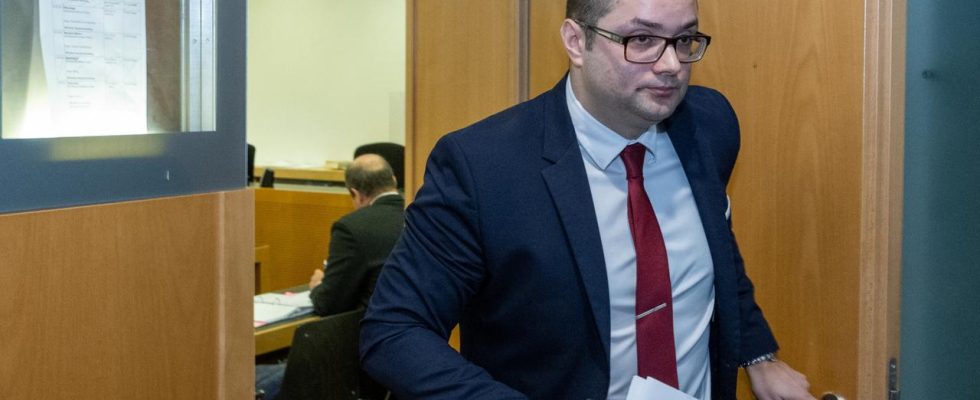No OSCE election observers were invited to the re-election of Russian President Putin. People selected by Russia for this purpose. AfD politicians traveled from Germany – and were enthusiastic.
He should express his criticism of the presidential elections in Russia, which in the eyes of Western experts were only staged elections. Andreas Jurca, AfD member of the Bavarian state parliament, doesn’t think twice. He does indeed have criticisms – but of a more technical nature: “Especially when it comes to transparency, in my opinion there are too many,” says Jurca with a stern look, “so that would be unusual in Germany now.” The AfD politician sits next to his party colleague Elena Roon in a television studio of RT DE, a propaganda channel close to the Kremlin, whose broadcast in Germany was banned by media regulators years ago.
The two are happy to give an interview here to talk about the experiences they have gained as so-called election observers at the invitation of Russia. It was clear that three Bavarian AfD members of the state parliament wanted to accept such an invitation tagesschau.de exclusively reported in advance.
Now videos, distributed on the online service Right at the beginning of the interview, Jurca emphasizes that they came to Russia on their own responsibility. Roon, on the other hand, explains that they accepted the invitation “even in the current situation” because, after all, it is the AfD’s line to maintain peaceful relations with Russia.
“Pleasant parliamentarians from the right-wing milieu”
When asked, Roon also raved about how the election days went: “The organization was very good,” she states. “There were even performances, there was even food and drink, everything was well looked after so that the electorate actually felt good and motivated.”
However, experts see it significantly differently. Concerts, lotteries or similar activities around the polling stations only serve one goal, explains Gerhard Mangott, Professor of International Relations at the University of Innsbruck: “It’s about increasing voter turnout, but not out of a democratic ambition, but in general Mobilizing people to go to elections that many don’t believe are free and fair.”
Roon is also the one who demonstrates the advantages of a Russian polling station in another video. One could mistake the four minutes in which she herself walks through the polling station in Vladivostok like a reporter, praising the “completely transparent” ballot boxes or the barrier-free voting booths, with an image film from the Kremlin.
Later in the television studio, the AfD politician can only think of a few differences from elections in Germany: the transparent ballot boxes that voters were so pleased with and the video recordings that were made in every polling station: “People have no problem with it, We’ve already spoken to several people.”
Political scientist Mangott, on the other hand, still has questions. For example, why the ballot boxes were left unguarded on the nights of the three election days. He also adds: “In these polling stations there are hardly any assessors who come from the opposition, and that’s why the door is open to manipulating the counting protocols the way it should be,” says Mangott.
For him it is clear that the AfD members of the state parliament did everything the Russian leadership needed through their trip and the subsequent statements. After all, Western observers confirmed the democratic character of the election with them, although at the same time the OSCE observers were not invited, “but only obliging parliamentarians from the right-wing milieu,” said Mangott.
No clear AfD line after re-election
Even the AfD federal executive board was not at all happy about this trip and had sent an email to MPs “strongly” recommending that they not go on the trip to Russia. The party leadership committee claims that decisions on the AfD’s foreign policy matters rest solely with the federal executive board.
The suspicion that AfD MPs could be exploited by Russia comes at a bad time for the party. The Süddeutsche Zeitung (SZ) has just reported on an internal report from the Federal Office for the Protection of the Constitution, according to which the party could possibly be classified as “certainly right-wing extremist”. According to the SZ, the intelligence service also cites the “relationship with Russia” as a new point.
The uncertainty in dealing with this is perhaps also a reason why the AfD is not yet pursuing a clear line in the aftermath of Vladimir Putin’s alleged election victory. Bernd Baumann, parliamentary director of the AfD parliamentary group, said in a press conference that Russia is “not a democracy by Western standards” – which sounds somewhat different than the experiences described by the Bavarian state parliament members. Neither he nor others “with us” congratulated Putin.
Co-party leader Tino Chrupalla does not want to offer any congratulations when asked before the parliamentary group meeting in the Bundestag. At the same time, on the Internet platform
A party friend of Chrupalla anticipates this. And not just anyone: the influential Hans-Thomas Tillschneider, who was part of the small leadership circle of the officially dissolved right-wing extremist wing of the AfD. Tillschneider is currently deputy state chairman of the AfD in Saxony-Anhalt. “Congratulations to him and to the Russian people,” he writes on his social media channels – once in German and once in Russian.

